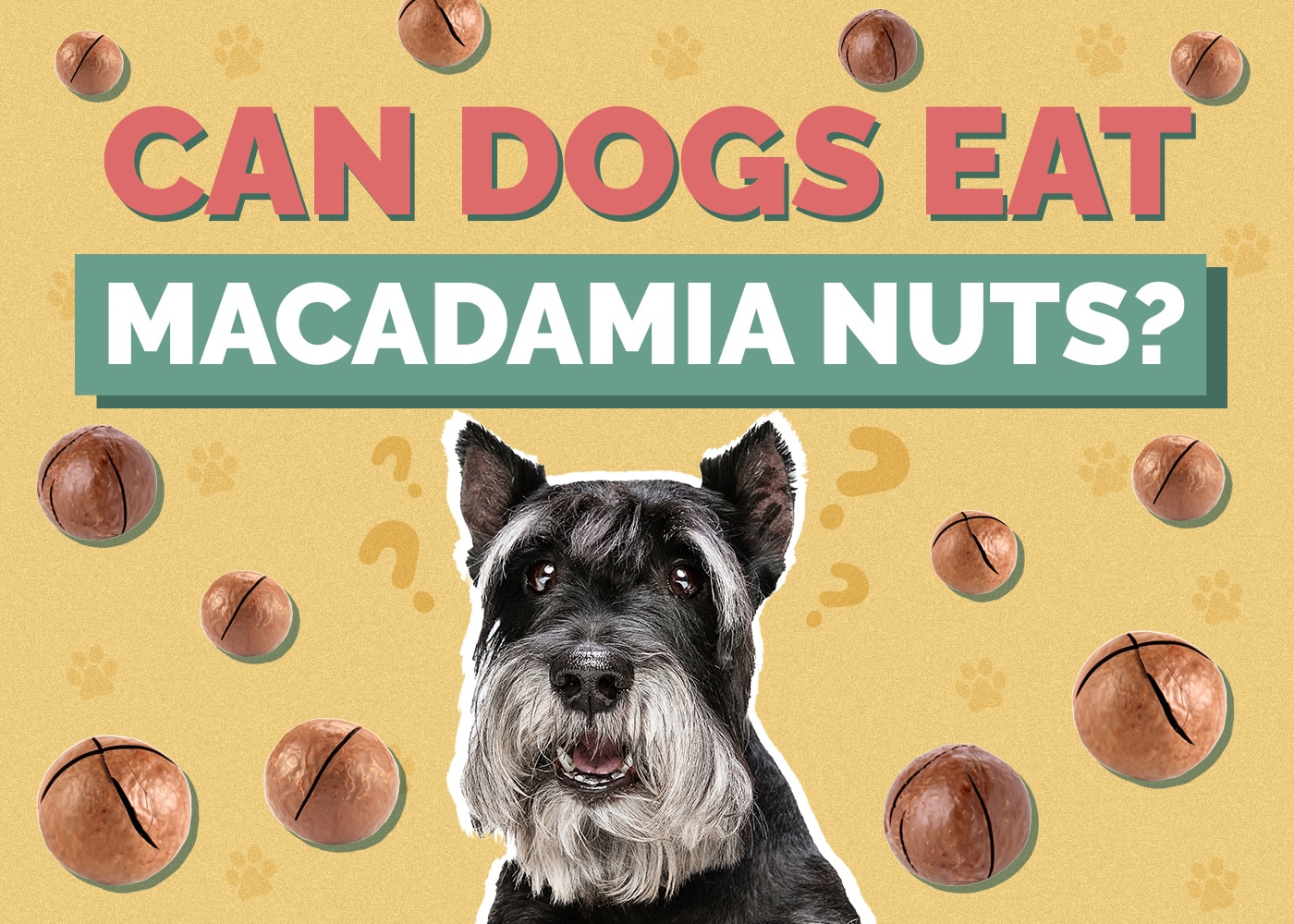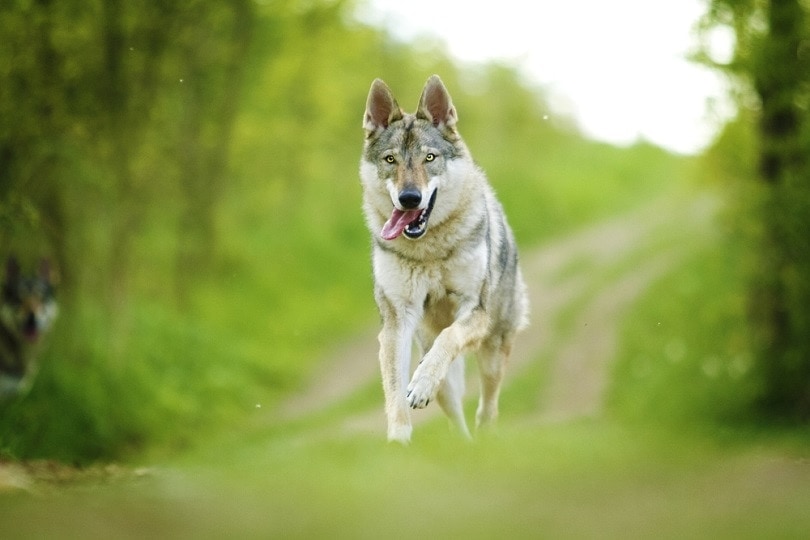Can Dogs Eat Macadamia Nuts? Vet-Reviewed Risks & Safety Guide

Updated on

Click to Skip Ahead
Macadamia nuts grow in Australia and while they are considered very healthy for humans, thanks to their high concentration of vitamins and minerals, they should not be given to dogs. They are toxic to dogs and are thought of as being one of the more dangerous foods to give to our canine pets. Experts say that the nuts are highly toxic and a dog only needs to eat a small amount to suffer ill effects. These ill effects typically include weakness, vomiting, and diarrhea. If the effects get worse, it can lead to dangerous inflammation of the pancreas.
Even mild symptoms can last for several days, and if you believe your dog has eaten Macadamia nuts and is showing signs of toxicity, you should consult a vet immediately.
What To Do If Your Dog Has Eaten Macadamias
Macadamia nuts are toxic to dogs and even relatively small amounts can lead to ataxia as well as vomiting and diarrhea. If you know your dog has eaten some, monitor them for signs of toxicity and call a vet immediately. Even if your dog has only eaten one nut, you must call the vet. They will be able to advise you whether your dog needs further treatment or not.
Treatment

Initially, your vet may recommend that you monitor your dog and watch for signs and symptoms. If your dog does show signs of ataxia or vomiting and diarrhea, and it has been caught quickly enough, the vet may administer activated charcoal or use some other method to induce vomiting to clear the nuts from your dog’s system. In very severe cases, the vet may introduce an IV line and administer drugs including antiemetics and analgesics.
Macadamia Nut Toxicity Symptoms
- Ataxia – Ataxia means a loss of balance and, in the case of Macadamia nut toxicity, this typically occurs in the hind legs so your dog may lose balance or become wobbly while walking.
- Vomiting and Diarrhea – Vomiting and diarrhea are common. These are signs that the dog’s system is trying to expel something that it knows is poisonous or toxic, in this case, the macadamia nuts.
- Depression – CNS depression, or Central Nervous System depression, is when the dog’s brain functions slow down. Your dog will appear lethargic.
Can Dogs Eat Any Nuts?

Not all nuts are toxic to dogs in this way. However, it is worth noting that nuts are high in fat, and too many nuts, too regularly, can lead to your dog putting on too much weight or becoming obese. Obesity is a major problem in dogs, as it is in humans, and it can lead to further illnesses like diabetes and an increased risk of heart problems. Some nuts are also a choking hazard. Almonds are difficult to bite, and their size means that they can get caught in your dog’s throat, obstructing the airways.
Top 5 Human Foods You Can Give to Dogs
While macadamia nuts are not safe, and it is not recommended that you give dogs any nuts, even though some are not toxic, some human foods can be given as occasional treats. Generally, you should avoid feeding any processed foods or foods that are high in sugar or salt. And don’t feed chocolate, grapes, onion, or garlic. Always check before feeding any human food to your dog to ensure that it is not toxic. The following five foods are safe to give your dog.
1. Carrots
While we can’t really claim carrots as being human food, they are perfectly safe for dogs to eat. Many pups like the crunchy texture of the carrot and because they are natural, they do not contain preservatives or any additional sugar or salt. Do make sure the carrot is washed thoroughly, and ideally only feed organic carrots to your dog, and you may want to slice or dice them to make them easier to eat.

2. Salmon
Salmon is not only safe for dogs but, in moderation, it is also good for them. It contains plenty of omega-3 fatty acids and is a good source of protein. Omega-3 fatty acids are good for the immune system which means that they help promote a healthy heart, kidneys, and other organs. You can feed salmon raw, but if you do want to cook it, use minimal oil or butter to fry the fish, and do not season the food with any salt or any other additives.
3. Peanut Butter
Peanut butter is made from peanuts and peanuts are one of the nuts that are not toxic to dogs. Make sure it is unsalted and does not contain any additional sugar, sweetener such as xylitol,, or other additives. Peanut butter is commonly used in treat toys because its sticky texture means that it will hold biscuits and other treats in place inside the toy. It can also be fed directly to your dog and a spoonful of the nutty treat can be a good way to sneak tablets into your dog.

4. Watermelon
Watermelon contains vitamins A and C. It is also high in water content, and it is a great, refreshing treat, especially on a hot summer day. Buy seedless varieties, however, as large watermelon seeds can be choking hazards and may get stuck in the intestines.
5. Eggs
Eggs are very healthy for dogs. They are often seen in the ingredients of commercial dog food because they are especially high in protein. If you want to feed eggs to your dog, cook them first to avoid salmonella and stick to boiled eggs rather than fried.
Conclusion
Macadamia nuts are a healthy snack for people, but they are considered highly toxic to dogs. If your dog eats a single macadamia, you should immediately contact your vet. Initially, they may recommend that you monitor the dog at home, but it may also be necessary to induce vomiting in a bid to clear the macadamias from your dog’s system.
Not all nuts are toxic, but most are high in fats and should be avoided as a regular treat. You can, however, use a small amount of peanut butter in a treat toy, and there are various foods that we eat that can be given safely to our dogs.
Related Reads:
- Can Dogs Eat Brazil Nuts? Vet-Reviewed Health Risks & FAQs
- Can Dogs Eat Hazelnuts? Are Hazelnuts Safe for Dogs?
Featured Image Credit: Macadamia_Nuts (Lmotas, Creative Commons CC0 1.0)












